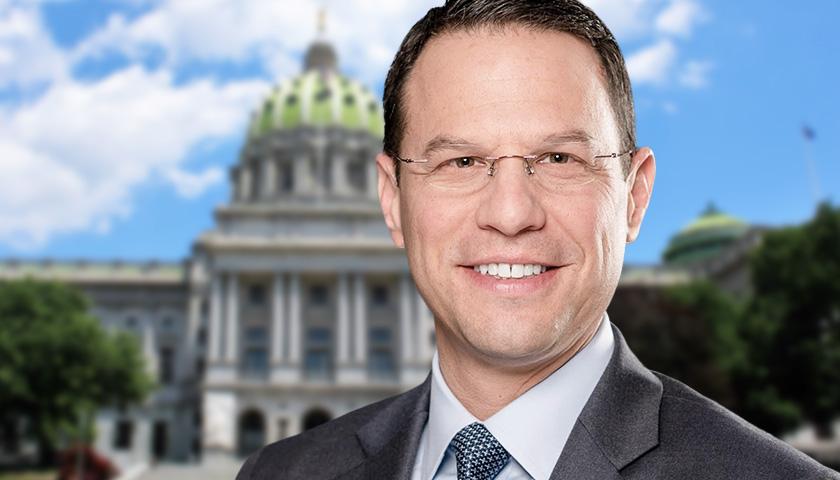Pennsylvania Josh Shapiro asked the state General Assembly members on Tuesday to support his requested $45.9 billion budget, which would increase spending by approximately 4 percent over current outlays.
The governor insisted he based his plan for Fiscal Year 2023-24 on “conservative” revenue estimates. And he did include some provisions appealing to anti-taxers and free marketers, including nixing the state cell phone tax, a move he estimates would save Pennsylvanians $124 million annually.
He also said he would favor accelerating the anticipated decade-long reduction of the state’s corporate net income tax from 9.99 percent to 4.99 percent, a process started by his predecessor Tom Wolf (D). Last year, the levy was the highest state corporate tax in the nation, behind New Jersey’s 11.5 percent.
Shapiro additionally requested lawmakers consider targeted tax relief for seniors and disabled residents by expanding the property-tax rent-rebate program. His policy would raise the tax break from $650 to $1,000 and hike the cap for renters and homeowners to $45,000 a year. The cap would be tied to the cost of living, so any boost in social-security payments would not deprive anyone of relief.
He said he hopes lawmakers will enact new tax credits, including $2,500 per year for the next three years for new licensees and certificate-holders in the teaching, nursing, and policing professions. Shapiro said the police provision will address the current shortfall of over 1,200 municipal law-enforcement personnel.
“Policing is a noble profession and good people want to do it,” he said.
The governor garnered further bipartisan applause for promising to streamline the commonwealth’s licensing and permitting processes by setting new timelines. Should agencies fail to issue licenses or permits by deadline, they would need to refund the applicant’s fees.
“We all know that our licensing and permitting process takes too damn long,” he said. “Those delays make it harder for a barber to relocate his business, harder to finish a major infrastructure project, harder for nurses to start critical jobs in our hospitals.”
But Shapiro envisions a spending hike that has made even some moderate Republican legislators wary, particularly insofar as the chief executive wants to draw upon the state’s Rainy Day fund to cover the increase. Many policymakers favor leaving the fund alone to utilize it during recessions and other emergencies, but not before crises occur.
“While I look forward to working with the governor to pass a fiscally responsible commonsense budget, how we get there is critical,” freshman Representative Kristin Marcell (R-Richboro), a member of House Appropriations Committee, said in a statement. “The governor’s plan to deplete our budget reserves and the Rainy Day Fund is concerning. With economists projecting an economic slowdown, if not a recession, it is imperative we preserve these funds to manage any revenue shortfalls.”
Spending priorities outlined in Shapiro’s speech included subsidizing a regional hydrogen hub in the Keystone State. The Montgomery County native requested other subsidies to assist women-owned and minority-owned businesses and to aid main-street revitalization. Shapiro would also double the $25 million fund to help poultry farmers cope with livestock depletion from avian influenza.
He continued his request list to include $66 million more for childcare spending, $36 million additionally for fire companies, $50 million in new money for emergency-call centers, and a $10 million fund for public defenders handling criminal cases for the indigent as well as more funds for probation and parole services.
Shapiro’s address was also pointedly left-wing in regulation and labor policy. He wants the state to raise the current $7.25-per-hour minimum wage to $15 per hour, though he noted that businesses are already acting independently to raise wages to make their positions more attractive to new hires.
Declaring that “so long as I am governor, Pennsylvania will never be a right-to-work state,” the governor urged lawmakers to pass funding for a new class of state labor-law compliance attorneys to ease private-sector unionization efforts.
“When it comes to dignity and respect, all workers should have the right to organize and bargain collectively,” Shapiro said.
Toward the end of his remarks, he turned his attention to environmental policy, particularly the train derailment in East Palestine, Ohio. He touted the promise by Norfolk Southern that the company will reimburse emergency services in Beaver and Lawrence counties and will contribute $1 million to a community relief fund for affected residents and businesses.
“This is a floor, not a ceiling, for what Norfolk Southern will owe the good people of western Pennsylvania,” Shapiro said.
And one element of the governor’s fiscal plans that has raised worry was not mentioned in his oration. Private-enterprise and fossil-fuel advocates bristled at the governor’s budget provision to generate $663 million through a de facto energy tax as part of a multi-state global-warming-mitigation pact known as the Regional Greenhouse Gas Initiative (RGGI).
On Tuesday, Nathan Benefield, senior vice president of the Harrisburg-based Commonwealth Foundation, published a reaction to Shapiro’s budget request that suggested home electricity prices will go up 30 percent as a result of RGGI.
“Rising energy prices are a top concern for Pennsylvania voters, who are struggling with increased cost of living, and looking for our elected leaders to work together with energy-producing companies to lower the cost of utility bills,” Benefield wrote. “Shapiro’s continued push for Wolf’s electric tax hike will only make matters worse.”
Benefield’s analysis took issue with the broader financial implications of the budget. He suggested the state undertake comprehensive fiscal reforms that will avert a tax increase that will inevitably come in 2026 if the commonwealth does not avert the deficits anticipated over the next four years.
– – –
Bradley Vasoli is managing editor of The Pennsylvania Daily Star. Follow Brad on Twitter at @BVasoli. Email tips to [email protected].
Photo “Josh Shapiro” by Josh Shapiro. Background Photo “Pennsylvania State Capitol” by Farragutful. CC BY-SA 4.0.





